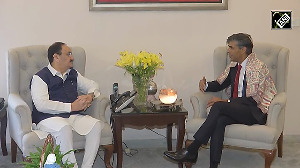Witnesses deposing in the judicial inquiry into the failed terrorism case against Indian doctor Mohammad Haneef, may not cooperate amid fear of defamation proceedings against them, as the inquiry lacks powers of a royal commission.
A fear of defamation proceedings could turn out to be a key reason for witnesses getting uncooperative, The Australian said on Thursday.
After the Clarke inquiry into the bungled case of Haneef held its first public hearing on Wednesday, Queensland Law Council president Megan Mahon told the daily that two protections commonly given to royal commissions indemnity against defamation and self-incrimination -- were not given to Clarke, exposing witnesses to civil action.
Mahon said that in the absence of those protections, many lawyers would advise their clients not to co-operate, the daily said. Lawyers for Haneef also raised doubts at reports suggesting that a key email, pointing to Haneef's innocence, was kept away from former immigration minister Kevin Andrews by the federal police.
Haneef, 27, was charged after his SIM card was allegedly found with an accused in the failed UK car bombings last year. He spent three weeks in detention before charges were dropped but he returned to India as his work visa was cancelled.
Former Supreme Court judge Clarke on Wednesday said that he would conduct private interviews with witnesses, feeding fears that much of the evidence would not be made public. Transcripts of interviews would be posted on the inquiry's website after information prejudicial to national security was removed.
Clarke said public hearings might be held if there is sufficient interest. Clarke had denied the request of seeking more powers for the inquiry, stating that all the agencies involved in the Haneef affair had assured him of their intention to co-operate fully.
Clarke also rejected a request by Haneef's lawyers, seeking permission to cross-examine witnesses. Meanwhile, all the main agencies involved in the Haneef affair that were represented at Wednesday's hearing were the Australian Federal Police, the Immigration Department, the Queensland Police, the Commonwealth Director of Public Prosecutions and the Australian Security Intelligence Organisation and all expressed their intention to co-operate.





